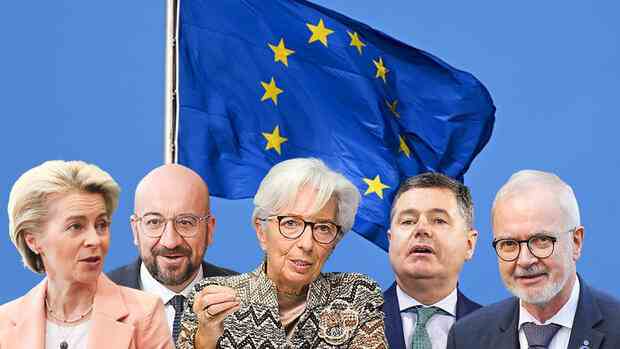Ursula von der Leyen is President of the European Commission, Charles Michel is President of the European Council, Christine Lagarde is President of the European Central Bank, Paschal Donohoe is President of the Eurogroup, Werner Hoyer is President of the European Investment Bank (from left)
(Photo: Imago, dpa)
The European Union is determined to drive the green and digital transformation. What we decide today will affect generations to come. It is our shared responsibility to do the right thing.
Creating a climate-neutral economy, increasing technological competitiveness and diversifying supply chains will be paramount to Europe’s continued prosperity and strategic sovereignty in the decades to come.
The need for financing is enormous, and the lion’s share must come from private capital.
The role of public investment is to provide policy direction and incentivize the massive incorporation of private capital, including but not limited to the participation of the European Investment Bank Group and national promotional banks.
The Single Market has boosted Europe’s prosperity since its inception 30 years ago, removing barriers to trade within the Union and attracting foreign investment, and Economic and Monetary Union is another engine for market integration.
Companies in the EU need investors for the green and digital transition
But we were too hesitant about one core element for too long: the capital markets union. So far, banks in Europe have provided the majority of investment financing. However, they alone cannot help the EU win the global investment race, especially against the US.
In the EU, 75 per cent of external corporate financing comes from bank loans and 25 per cent from the bond markets – in the US it is exactly the opposite. Our start-ups and scale-ups are looking for capital.
Businesses, particularly small and medium-sized ones, are struggling to find the long-suffering and risk-taking investors they need to invest in green and digital transformation.
For example, the market capitalization of the EU as a percentage of economic output is less than half that of the United States and also lags behind that of Japan, China and the United Kingdom. However, Europeans have much higher savings than Americans.
>> Read also: In response to the IRA, the EU should accelerate the capital markets union
It is our responsibility to ensure that European companies can find the financing they need – here, in the EU. We need a capital markets union in which the enormous savings in Europe are channeled to tomorrow’s growth engines.
To realize their full potential, we need to move beyond the current patchwork of national frameworks and, in some cases, undeveloped capital markets. In this way, the EU will be strengthened as an investment location and the euro will become an even more attractive currency.
A true Capital Markets Union is within reach
The EU has already taken some crucial steps towards creating a single market for capital. However, we must step up our efforts and our ambition to remove the remaining obstacles in cross-border financial transactions and to enable further harmonisation.
These include more uniform insolvency laws, more easily accessible financial information, easier access to capital markets, especially for smaller companies, robust market infrastructures and more integrated capital market supervision.
Deepening the Capital Markets Union requires a concerted effort involving policymakers and market participants across the Union. It requires strong political will and ownership at all levels of government.
There is a need for speedy negotiations between the European Parliament and the Member States in the Council on important legal texts, which urgently need to be concluded. It takes courage and openness to change. We are determined to move forward quickly.
Time is running out. We have made impressive progress in financially integrating Europe over the past two decades, but it is time to be more ambitious. A true Capital Markets Union is within reach.
The greatest industrial change of our time will take place in the coming decades. It will determine our long-term competitiveness. So let’s make sure we have the capital to do it!
The authors: Paschal Donohoe is President of the Eurogroup. Werner Hoyer is President of the European Investment Bank. Christine Lagarde is President of the European Central Bank. Ursula von der Leyen is President of the European Commission. Charles Michel is President of the European Council.
More: Clearing, IPOs, insolvency law – the EU wants to strengthen the capital markets with three reforms
